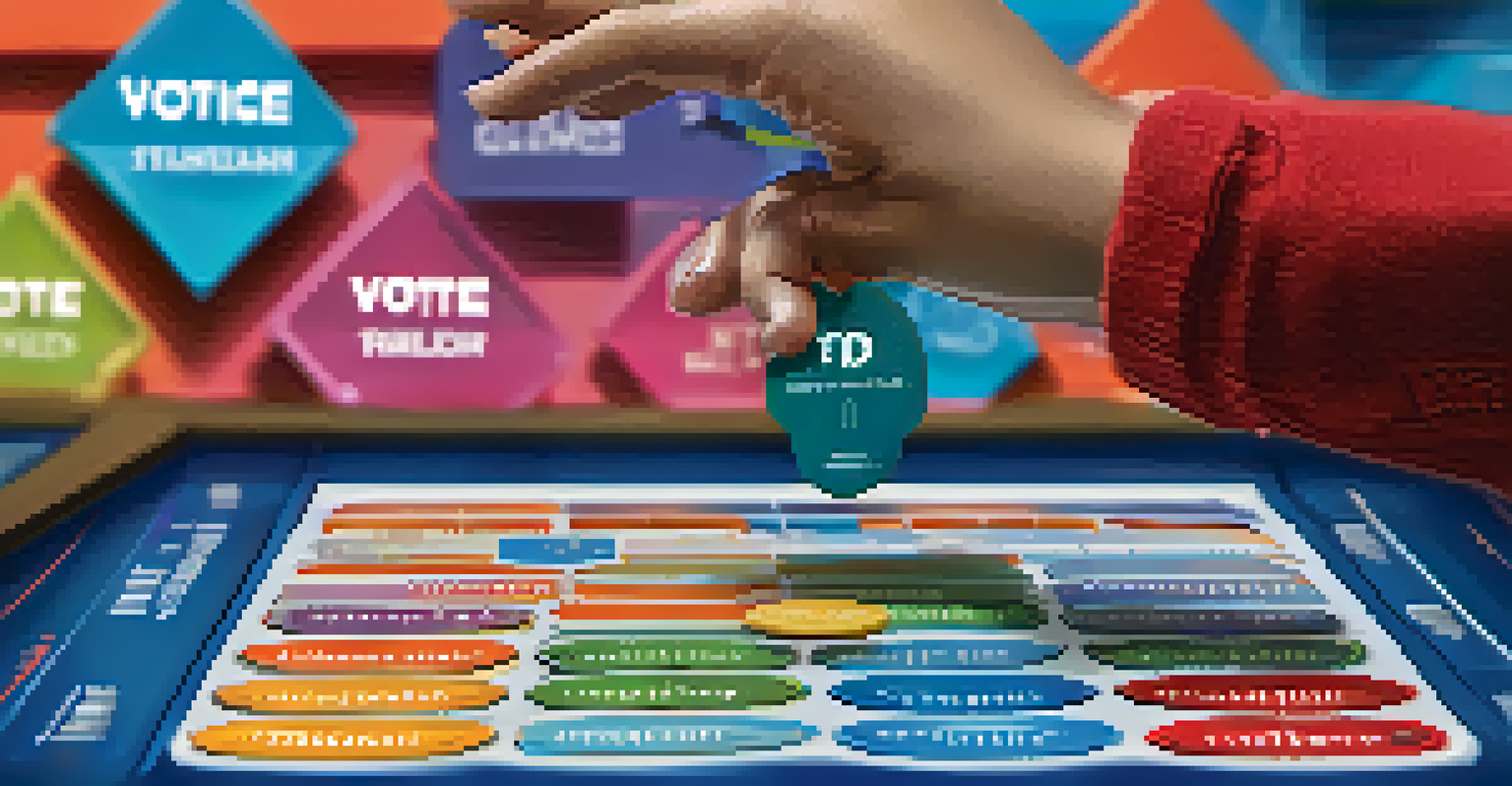Governance Tokens: The Future of Decentralized Decision Making

What Are Governance Tokens and Their Role?
Governance tokens are digital assets that empower holders to participate in decision-making processes within decentralized networks. Unlike traditional tokens, they provide voting rights, enabling users to influence project development, protocol upgrades, and resource allocation. This shift towards decentralized governance reflects a growing desire for transparency and community involvement in blockchain ecosystems.
Decentralization is the future of governance, allowing communities to shape their own destinies.
For instance, in a decentralized finance (DeFi) project, governance tokens allow users to vote on key proposals, such as changes to interest rates or liquidity pools. By giving stakeholders a voice, these tokens promote a sense of ownership and accountability. This model contrasts sharply with centralized systems, where decisions are often made behind closed doors by a small group of individuals.
As the landscape of digital assets evolves, governance tokens are becoming increasingly vital. They represent not just a financial investment but also an opportunity for individuals to shape the future of their chosen projects and communities. This participatory approach is what sets decentralized platforms apart from traditional systems.
The Mechanism Behind Governance Tokens
Governance tokens typically function on blockchain platforms, allowing users to propose and vote on changes through a transparent mechanism. When a proposal is submitted, token holders can cast their votes, with the weight of each vote often proportional to the number of tokens held. This creates a system where larger stakeholders have more influence, but it also encourages broader participation as users may collaborate to propose changes.

For example, a community may gather to propose a new feature for a decentralized application (dApp). Token holders can discuss the proposal, suggest amendments, and ultimately vote on whether to implement it. This process not only fosters engagement but also cultivates a diverse range of ideas that can lead to innovative solutions.
Governance Tokens Enable Participation
Governance tokens empower users to vote on key decisions, promoting transparency and community involvement in decentralized networks.
Moreover, some projects implement a quadratic voting system, which reduces the power of large holders and encourages a more democratic approach. By understanding the mechanics of governance tokens, participants can better appreciate the value of their involvement in these decentralized ecosystems.
The Benefits of Decentralized Governance
Decentralized governance brings several advantages to the table, primarily transparency and inclusivity. In traditional systems, decision-making can often feel opaque, leading to distrust among users. However, with governance tokens, all voting and proposal processes are recorded on the blockchain, allowing anyone to verify outcomes and decisions.
Blockchain technology will change the way we govern ourselves, making it transparent and inclusive.
Additionally, inclusivity is a hallmark of decentralized governance. By allowing a diverse range of voices to participate, these systems can harness collective intelligence, leading to more balanced and innovative outcomes. This community-driven approach ensures that the needs and preferences of a broader audience are considered in decision-making processes.
Finally, decentralized governance can lead to improved resilience. Since decisions come from a collective rather than a single entity, projects can adapt more rapidly to changes in the market or community needs. This adaptive capability is crucial for the longevity of any project in the fast-paced digital world.
Challenges Facing Governance Tokens
Despite their benefits, governance tokens also face significant challenges. One major issue is the potential for governance attacks, where a malicious actor accumulates enough tokens to manipulate votes in their favor. This risk highlights the importance of robust security measures and governance structures to protect against such threats.
Another challenge is voter participation. While governance tokens empower holders, many still do not engage in voting processes due to apathy or lack of understanding. This can lead to decisions being made by a small, active subset of token holders, undermining the democratic nature of the system.
Challenges in Governance Participation
Despite their advantages, governance tokens face issues like governance attacks and low voter engagement, which can undermine their effectiveness.
Lastly, the complexity of governance proposals can deter participation. Users may feel overwhelmed by technical jargon or intricate systems, which can hinder their ability to make informed decisions. Simplifying these processes is essential for fostering a more engaged and informed community.
Real-World Examples of Governance Tokens
Several successful projects illustrate the power of governance tokens in action. One prominent example is MakerDAO, a decentralized lending platform that uses its MKR token to enable holders to vote on key decisions, such as risk parameters and collateral types. This model has allowed the community to adapt to changing market conditions effectively.
Another example is Uniswap, a decentralized exchange that employs the UNI token for governance. Token holders can propose and vote on changes to the protocol, ensuring that the platform evolves according to the needs of its users. This participatory approach has contributed to Uniswap's growth and innovation within the DeFi space.
These examples showcase how governance tokens can foster community-driven development and decision-making. As more projects adopt this model, we can expect to see a broader trend toward decentralized governance across various sectors.
The Future of Governance Tokens
Looking ahead, governance tokens are poised to play a pivotal role in shaping the future of decentralized decision-making. As the blockchain ecosystem continues to grow, more projects are likely to implement governance tokens, further democratizing the decision-making process. This trend aligns with the broader movement toward decentralized finance and digital ownership.
Moreover, advancements in technology and governance models could lead to even more innovative applications for governance tokens. For instance, integrating artificial intelligence and machine learning could enhance the proposal and voting processes, making them more efficient and user-friendly. This evolution will likely attract a wider audience to participate in governance.
Future Trends in Governance Tokens
As blockchain technology evolves, governance tokens will likely become more integral to decentralized decision-making, fostering inclusivity and innovation.
Ultimately, the future of governance tokens will depend on the communities that support them. As more people recognize the importance of their involvement, we can expect a shift toward more inclusive and transparent governance structures that empower users and promote sustainable growth.
Getting Involved with Governance Tokens
For those interested in joining the governance token movement, the first step is to explore projects that resonate with your values and interests. Many platforms offer governance tokens, so researching their missions, communities, and active proposals is essential. This knowledge will help you make informed decisions about where to invest your time and resources.
Once you've identified a project, acquiring governance tokens is typically straightforward. You can purchase them on various cryptocurrency exchanges or earn them through participation in network activities, such as providing liquidity or voting on proposals. Engaging with the community through forums and social media can also enhance your understanding and connection to the project.

As you become more involved, remember that your voice matters. Participating in governance by voting and proposing ideas can significantly impact the direction of the project. By taking an active role, you contribute to shaping a more decentralized and equitable future.